Can bearded dragons eat asparagus? Many reptile owners wonder this when they try to add variety to their pet’s meals. Asparagus offers vitamins, fiber, and antioxidants — but can bearded dragons eat asparagus safely, or is it one of those veggies better left out?
Feeding a bearded dragon isn’t just about giving them greens. You need to understand what vegetables are safe and how often to serve them. Some foods, like asparagus, may seem healthy at first glance but have hidden concerns like oxalates or poor calcium ratios.
In this article, you’ll get clear answers. We’ll explore the benefits, risks, and how to feed asparagus properly — if at all.
Can Bearded Dragons Eat Asparagus Safely? Let’s Break It Down
Asparagus can be a tempting vegetable to offer your bearded dragon, but it’s not without concerns. While it contains useful nutrients like vitamins A and K, it also brings some risks. These include high phosphorus levels, oxalates, and goitrogens — all of which can affect your pet’s health if not managed properly. The key is moderation. Feeding asparagus occasionally is unlikely to cause harm, especially if it’s part of a well-balanced diet. However, it should never be a daily staple. Bearded dragons need a calcium-rich diet to avoid metabolic bone disease, and asparagus doesn’t support that on its own. If you decide to offer it, combine it with high-calcium vegetables like collard greens. This helps balance the calcium-to-phosphorus ratio. Always observe your dragon after introducing new foods. Signs like lethargy or digestive issues mean it may not agree with them. When in doubt, consult a reptile vet. In summary, bearded dragons can eat asparagus safely, but only if it’s prepared properly, served in small amounts, and not fed too frequently.
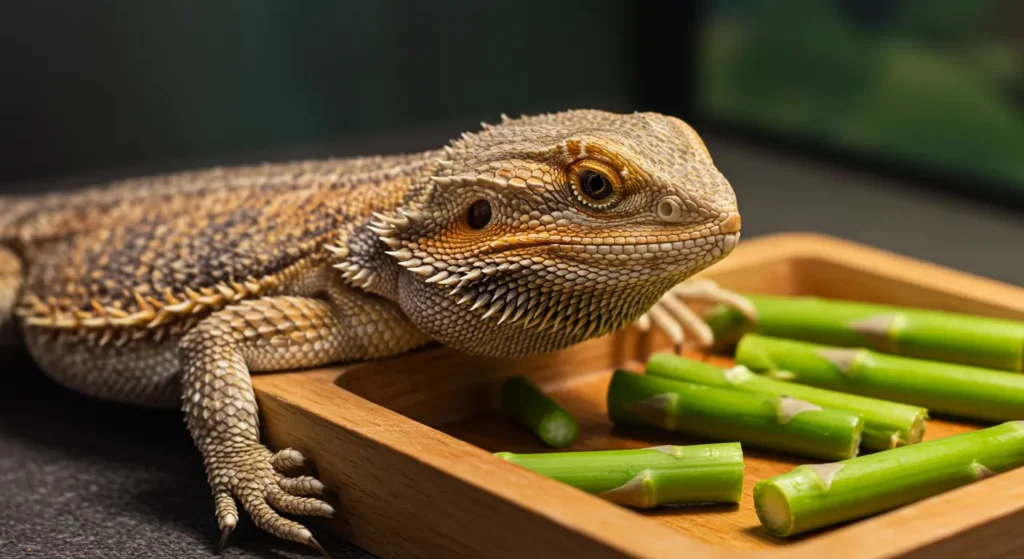
Nutritional Value of Asparagus for Bearded Dragons
Asparagus contains several beneficial nutrients that can support your bearded dragon’s overall health. It’s especially rich in vitamins A and K, which play roles in vision, immunity, and blood clotting. Folate is another helpful component that supports healthy cells and tissue repair. Additionally, the fiber in asparagus aids digestion and can help regulate bowel movements. However, the vegetable is not without its downsides. Asparagus has moderate calcium but also contains higher phosphorus, which can interfere with calcium absorption. In reptiles like bearded dragons, this imbalance can lead to health issues over time if not corrected. That’s why asparagus should only be a small part of a larger, varied vegetable rotation. Compared to more balanced greens like mustard, turnip, or collard greens, asparagus falls short as a daily staple. It’s best viewed as a supplemental veggie, not a core part of their regular diet. Used wisely, it can offer some nutrition without overwhelming your dragon’s system — just don’t rely on it too often.
Risks of Feeding Asparagus to Bearded Dragons: Oxalates & Goitrogens
Feeding asparagus to your bearded dragon comes with a few notable risks — especially due to its oxalate and goitrogen content. Oxalates are compounds that can bind to calcium in the digestive tract, making it harder for your dragon’s body to absorb this crucial mineral. Over time, low calcium absorption may lead to metabolic bone disease, a serious and often irreversible condition in reptiles. Asparagus also contains goitrogens, which may interfere with thyroid function, particularly when fed in large amounts. While an occasional serving isn’t dangerous for most dragons, consistently offering foods high in oxalates or goitrogens can create long-term health problems. That’s why moderation is key. To minimize risks, pair asparagus with calcium-rich vegetables and offer it only occasionally — never as a daily item. Also, watch for signs of distress such as tiredness, poor appetite, or unusual behavior. If these symptoms show up after eating asparagus, it may not be the right fit for your dragon’s diet. Consult a reptile vet if you’re unsure.
Is Asparagus Too Fibrous for Bearded Dragons? Digestive Effects Explained
Fiber plays an important role in a bearded dragon’s digestive health. In small amounts, it can help keep bowel movements regular and prevent constipation. Asparagus offers a moderate amount of fiber, which can be beneficial when fed occasionally. However, too much fiber can lead to digestive discomfort, especially in reptiles that are not used to high-fiber vegetables. Signs of fiber overload may include loose stools, bloating, or reduced appetite. If your bearded dragon experiences these symptoms after eating asparagus, it’s a sign their system may be reacting poorly. Every dragon has different tolerance levels, so what works for one may not work for another. It’s best to introduce asparagus slowly and in small portions, especially if your dragon hasn’t had it before. Also, always mix it with other low-fiber, high-calcium greens to help balance the meal. If digestive symptoms persist or worsen, stop feeding asparagus and reach out to a qualified reptile veterinarian. They can help you adjust the diet and rule out other issues. Overall, asparagus fiber can help — but only in moderation.
How Often Can Bearded Dragons Eat Asparagus?
Feeding frequency is key to a balanced reptile diet. Knowing how often to offer asparagus ensures your bearded dragon receives variety without exposure to harmful compounds. Moderation and portion control help maintain overall health.
Can Bearded Dragons Eat Asparagus Weekly as a Treat?
Asparagus can be offered to your bearded dragon, but only as an occasional treat — not a daily food. Feeding it once a week is generally considered safe for healthy adult dragons. This limited frequency helps reduce the risk of health problems linked to compounds like oxalates and goitrogens, which are naturally present in asparagus. These compounds can interfere with calcium absorption and thyroid function if consumed too often. Weekly feeding allows your dragon to benefit from asparagus’s vitamins and fiber without building up harmful levels of these compounds. It’s important to remember that asparagus should only supplement, not replace, the core of your dragon’s diet. Their main meals should still focus on calcium-rich greens and gut-loaded insects. If your dragon is young, sick, or recovering from illness, you may want to skip asparagus entirely until their health is stable. As always, observe how your dragon reacts to new foods. If they show signs of discomfort or digestive issues, scale back or stop feeding asparagus altogether. In moderation, though, asparagus once a week can be part of a healthy and diverse feeding routine.
Safe Serving Size of Asparagus for Bearded Dragons
When feeding asparagus to your bearded dragon, portion control is key. A safe serving should make up no more than 5–10% of their total vegetable intake during a single feeding. This means just a few small, finely chopped pieces — not an entire spear. The goal is to provide enough for nutritional variety without overwhelming your dragon’s digestive system. Cutting asparagus into bite-sized chunks also reduces the risk of choking and improves digestibility. Avoid giving large amounts, even occasionally, as it may lead to digestive upset or interfere with calcium absorption due to its phosphorus and oxalate content. Also, keep in mind that younger dragons have more delicate systems and may not tolerate fibrous foods like asparagus as well as adults. Pair asparagus with high-calcium vegetables such as collard greens or dandelion greens to help balance the calcium-to-phosphorus ratio in the meal. A varied diet supports better health than relying on one or two vegetables. By keeping the serving size small and occasional, you can safely include asparagus in your bearded dragon’s feeding routine.
Raw or Cooked Asparagus for Bearded Dragons: What’s Better?
Both raw and cooked asparagus can be fed to bearded dragons, but each has pros and cons. Raw asparagus is more nutritious — it retains its full content of vitamins, minerals, and fiber. This makes it the better option if your dragon handles fibrous vegetables well. On the other hand, lightly cooked asparagus is easier to chew and digest. Steaming it briefly can help soften the tough fibers without removing too many nutrients. Never season or oil-cook asparagus. Boiling can strip away vitamins, and frying introduces unhealthy fats that reptiles can’t process. If you choose to cook it, keep it simple — steam, cool, and chop it before serving. Some dragons prefer the softer texture of cooked vegetables, especially if they’re older or recovering from illness. No matter which form you choose, always wash the asparagus thoroughly to remove any pesticides or dirt. Rotate between raw and lightly steamed if you want to offer variety. Both methods can work — what matters most is portion size, preparation, and how well your dragon tolerates it.
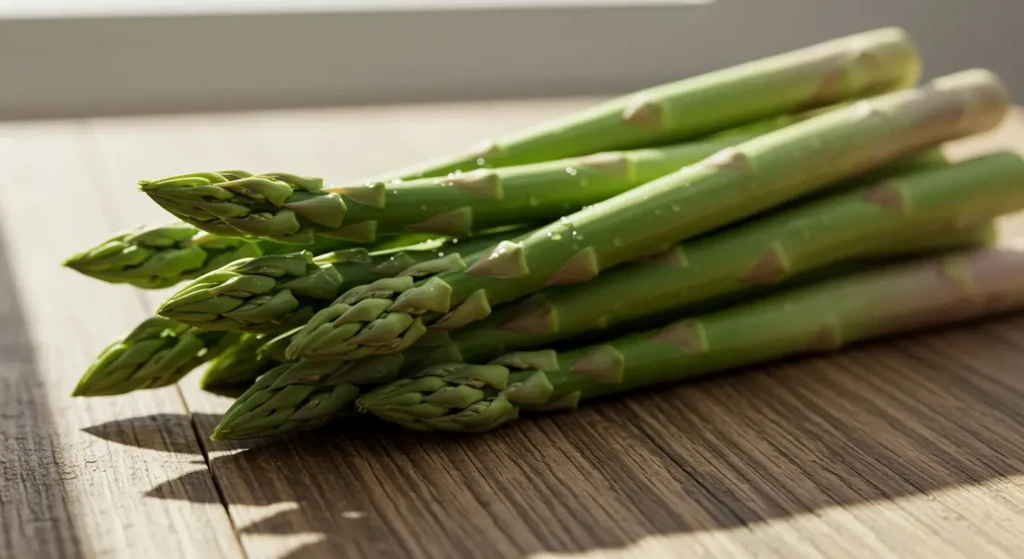
Alternatives to Asparagus for a Balanced Reptile Diet
A healthy bearded dragon diet depends on variety and balance. While asparagus can be an occasional treat, many other vegetables offer better overall nutrition. Rotating a range of veggies prevents nutrient gaps and keeps your dragon interested in their food. This variety also reduces the risk of digestive problems caused by overfeeding certain foods like asparagus, which contains oxalates and goitrogens. Key nutrients such as calcium, vitamins A and D3, and fiber should be prioritized. To learn more about these essential nutrients and how they impact your pet’s health, check out detailed guides like Bearded Dragons Calcium and Vitamin D3: Everything You Need to Know. Including a mix of leafy greens, colorful vegetables, fruits, and insects ensures your bearded dragon thrives on a diet that mimics their natural feeding habits. Always keep food fresh, clean, and prepared safely to maximize benefits.
Best Daily Greens for Bearded Dragons
Leafy greens should form the foundation of your bearded dragon’s daily vegetable intake. Among the best options are collard greens, mustard greens, and dandelion greens. These greens are rich in calcium, which is essential for healthy bones and proper metabolic function. They also provide important vitamins such as A and C, supporting the immune system and skin health. Unlike asparagus, these greens have a favorable calcium-to-phosphorus ratio, helping prevent metabolic bone disease. Offering a variety of these daily staples ensures your dragon receives consistent nutrition. Freshness is important — always wash greens thoroughly to remove pesticides and chop them into manageable pieces. While insects provide protein, greens are critical for supplying fiber and micronutrients. By consistently feeding these calcium-rich greens, you support your bearded dragon’s growth, energy, and long-term health.
Vegetable Alternatives to Asparagus for Bearded Dragons
To keep your bearded dragon’s diet diverse and nutritious, it’s good to rotate in vegetables like bell peppers, squash, and zucchini. Bell peppers are excellent sources of vitamin C and antioxidants, which help protect cells and boost immune function. Squash and zucchini contribute hydration due to their high water content, plus valuable fiber to aid digestion. These veggies add variety and color to meals, preventing boredom and encouraging appetite. However, they shouldn’t replace the primary leafy greens because their calcium content is lower. Offer these vegetables a few times per week alongside staple greens and live insects for a well-rounded diet. Preparing them in small, bite-sized pieces makes feeding easier and safer. By rotating these options, you ensure your bearded dragon enjoys a balanced diet that covers a wide range of nutrients.
Other Foods Besides Asparagus for Bearded Dragons: Fruits & Insects
Fruits such as berries and melons provide hydration and some vitamins but should only be a small part of your bearded dragon’s diet. Their natural sugar content means overfeeding can lead to digestive upset and weight issues. Always offer fruits in moderation and as occasional treats rather than staples. In contrast, insects like crickets and dubia roaches are crucial for supplying essential proteins and fats. Protein supports muscle growth, energy, and overall vitality. Live insects also encourage natural hunting behavior, providing mental stimulation. Gut-loading insects with nutritious foods before feeding further boosts their value. Balancing fresh vegetables, limited fruits, and regular insect feedings is the best approach for a healthy, natural diet. This combination supports your dragon’s development and keeps them active and thriving.
How to Feed Asparagus to Bearded Dragons Safely
If you decide to include asparagus in your bearded dragon’s diet, proper preparation and moderation are crucial. This section guides you through safe feeding practices to minimize health risks.
How to Feed Asparagus to Bearded Dragons Safely
If you choose to add asparagus to your bearded dragon’s diet, preparation and moderation are key. Always start by thoroughly washing the asparagus to remove any pesticides, dirt, or chemicals that could harm your pet. Next, cut the asparagus into small, bite-sized pieces to reduce choking risk and make it easier to eat. Be sure to remove the tough, fibrous ends because they can be difficult to digest and may cause gastrointestinal discomfort. Feeding asparagus in small amounts limits exposure to potentially harmful compounds like oxalates and goitrogens. Remember, asparagus should only be an occasional treat rather than a staple vegetable. Observe your dragon carefully after introducing asparagus for any signs of intolerance or digestive upset. Providing clean, well-prepared vegetables helps support your dragon’s health and keeps feeding safe and enjoyable.
Combining Asparagus with Other Vegetables for Bearded Dragons
To create a nutritious and balanced meal, mix asparagus with calcium-rich leafy greens such as collard greens, mustard greens, or dandelion greens. This combination improves the calcium-to-phosphorus ratio of the meal, which is critical for healthy bone growth and metabolic function in bearded dragons. A salad bowl with varied vegetables also helps cover any nutritional gaps that asparagus alone might leave. Including diverse vegetables encourages a balanced diet and prevents boredom. Remember to chop all veggies into manageable pieces for easy eating. Rotating vegetables regularly not only boosts nutrient variety but also promotes a more natural feeding experience. For ideas on other safe vegetables to mix with asparagus, check out our article Can Bearded Dragons Eat Basil? Yes – And They Might Love It! This variety keeps your pet’s diet wholesome and appealing.
How Bearded Dragons React to Asparagus: Warning Signs to Watch
After feeding asparagus, it’s important to monitor your bearded dragon closely. Watch for any signs of adverse reactions like lethargy, loose stools, bloating, or a loss of appetite. These symptoms may indicate digestive distress or intolerance to asparagus. If you notice any of these signs, stop feeding asparagus immediately and remove it from your dragon’s diet. Persistent or severe symptoms require a visit to a qualified reptile veterinarian to rule out underlying health problems. Some dragons tolerate asparagus well, while others may react poorly depending on their individual sensitivity and overall health. Early detection of problems ensures your pet stays healthy and comfortable. Always introduce new foods gradually, and never feed asparagus daily. Prioritize foods with a proven track record of safety and nutrition to keep your bearded dragon thriving.
Final Verdict: Can Bearded Dragons Eat Asparagus Safely?
Deciding whether to feed asparagus to your bearded dragon requires balancing its nutritional benefits against potential risks. Asparagus contains valuable vitamins and fiber but also includes compounds like oxalates and goitrogens that may interfere with calcium absorption and thyroid health if consumed too often. When fed in moderation and prepared correctly, asparagus poses minimal risk to most healthy bearded dragons. It should never replace staple vegetables known for their high calcium content. Instead, asparagus is best given as an occasional treat, incorporated into a varied diet rich in leafy greens and live insects. Always observe your pet’s reaction after introducing new foods. If any signs of distress appear, discontinue feeding and seek veterinary advice. By approaching asparagus feeding responsibly, you can safely include it without jeopardizing your dragon’s health.
Pros and Cons of Feeding Asparagus to Bearded Dragons
Asparagus offers some nutritional benefits, such as vitamins A and K, folate, and dietary fiber, which support vision, immune function, and digestion. However, it also contains oxalates, which bind calcium and reduce its absorption, and goitrogens, which may impact thyroid function if fed excessively. These compounds make asparagus less ideal than other vegetables like collard greens or mustard greens, which provide a better calcium-to-phosphorus ratio. The key is moderation. Feeding asparagus occasionally and in small amounts reduces the risk of health problems. Overfeeding can lead to metabolic bone disease or thyroid issues in bearded dragons. Therefore, asparagus should be considered a supplemental vegetable, not a staple, to maintain balanced nutrition.
When to Consult a Reptile Vet
If your bearded dragon displays unusual symptoms after eating asparagus or any new food, consult a reptile veterinarian promptly. Signs to watch for include lethargy, loss of appetite, diarrhea, bloating, or unusual behavior. A vet can provide personalized advice, dietary adjustments, and identify any underlying health issues early. Early veterinary intervention helps prevent serious complications and ensures your pet receives proper care. This is especially important if you notice symptoms persist after stopping asparagus feeding. Regular check-ups and professional guidance are essential for keeping your bearded dragon healthy and happy. When introducing any new food, always prioritize safety and expert recommendations.
Better to Be Safe or Adventurous? Your Call as a Keeper
As a responsible keeper, your bearded dragon’s health should always come first. While adding variety to their diet can be beneficial, it’s important to prioritize foods that are known to be safe and nutritious. Asparagus can be offered sparingly, but it should never replace staple vegetables like calcium-rich greens or a steady supply of live insects. Experimenting with new foods is natural and can keep your dragon’s diet interesting, but be cautious with items that carry potential risks, especially for young, sick, or sensitive dragons. Focus on consistent, balanced nutrition to support their long-term health and growth. If you’re curious about other occasional vegetables to safely include, check out our article on Can a Bearded Dragon Eat Tomatoes Daily? Expert Feeding Tips. It offers helpful guidance on feeding tomatoes and other treats responsibly. Ultimately, moderation and informed choices will keep your bearded dragon thriving for years to come.

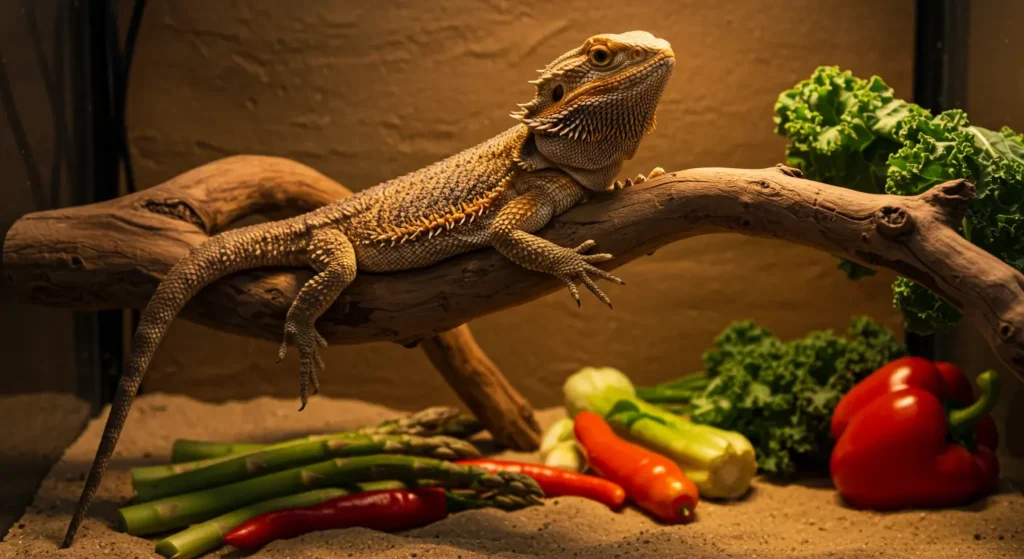
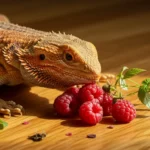
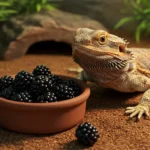
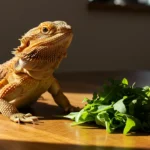
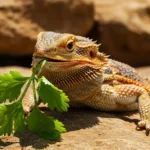
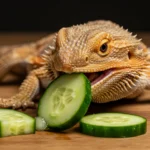
1 thought on “Can Bearded Dragons Eat Asparagus? The Answer Isn’t So Simple”